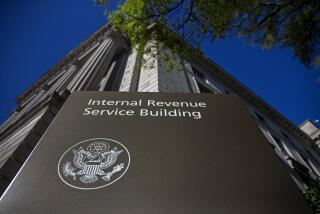Fewer Healthy Firms Legally Escape Taxes : Study Attributes Drastic Shrinkage to ’86 Reform
WASHINGTON — The number of giant profitable corporations that legally paid no federal income tax was cut by more than half last year, according to a new study, but backers of the landmark 1986 tax overhaul said Thursday that the figure may never drop to zero.
Sixteen of 250 profitable companies surveyed by Citizens for Tax Justice were able to wipe out their entire federal liability, down from 40 in 1986 and 72 in 1982, according to the organization, which is based in Washington and financed by unions, churches and social groups. Some of the 16 companies disputed the report.
Paul Huard, vice president of the National Assn. of Manufacturers, criticized the report for what he called “this horror-story type of argument.” It is unfair to look at a company’s taxes for one year only, he said, adding that “the nature of corporate profits and tax accounting being what it is, you are going to get these cyclical variations from year to year.”
Citizens for Tax Justice said most of the change was caused by the sweeping law enacted in 1986, which reduced or removed several individual and corporate deductions and credits while cutting tax rates.
“Tax reform has passed the most critical test of its effectiveness,” said Robert McIntyre, director of the organization.
“Tax reform may not have made things less complex . . . (or) cut everyone’s tax bill,” McIntyre told a news conference. “But tax reform has made great strides toward a system that puts all profitable corporations back on the tax rolls. And that should, over time, help restore public confidence in our tax system.”
Depreciation Top Benefit
Sen. Bob Packwood (R-Ore.) and Sen. Bill Bradley (D-N.J.), key authors of the 1986 law, voiced the same sentiments. Packwood said he was surprised that the number of legal tax avoiders had dropped so quickly.
Some companies continue to hold “loss carrybacks,” which are excess deductions that are used to wipe out past years’ tax liabilities and generate a current-year refund, Packwood noted. As those carrybacks are used up, he predicted, the number of companies paying no tax will continue to dwindle.
But there may never be a time when every profitable company pays a tax, he said, because “companies may come up with things that we didn’t think about” when writing the law.
The biggest corporate tax benefit remains accelerated depreciation, which permits companies to recapture through the tax system part of the money spent for plant and equipment.
THE UNTAXED 16
Citizens for Tax Justice claims the following 16 highly profitable public companies paid no federal income tax in 1987. GM and IBM denied the report.
COMPANY...1987 PROFIT IN MILLIONS
IBM...$2,930
GM...2,400
Aetna Life...1,010
Goodyear Tire...573.7
Carolina Power...536.3
Hewlett-Packard...405
Consumers Power...384.3
Illinois Power...344.5
Gulf State Utilities...273.2
Baxter Travenol...233.6
Ashland Oil...158.5
Corning...122.6
Pennzoil...76.8
Greyhound...62.
Ogden...55.7
Sequa Corp....42.3
Source: Citizens for Tax Justice
More to Read
Inside the business of entertainment
The Wide Shot brings you news, analysis and insights on everything from streaming wars to production — and what it all means for the future.
You may occasionally receive promotional content from the Los Angeles Times.










